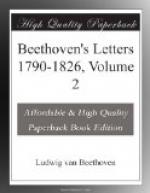I am myself writing to Wocher [cabinet courier to Prince Esterhazy? No. 333], and for more speed I send by Carl, who chances to be driving in, the application to Prince E. Be so good as to inquire the result; I doubt its being favorable, not expecting much kindly feeling on his part towards me, judging from former days.[1] I believe that female influence alone ensures success with him in such matters; at all events, I now know, by your obliging inquiries, how I can safely write to this Scholz. The bad weather, and more especially the bad atmosphere, prevented my paying her [Countess Schafgotsch] a visit about this affair.[2]
Your amicus,
BEETHOVEN.
P.S. Nothing yet from Dresden! Schlemmer [the copyist] has just been here asking again for money. I have now advanced him 70 Gulden. Speculations are for commercial men, and not for poor devils like myself. Hitherto the sole fruit of this unlucky speculation [a subscription for his Mass] are only more debts. You have, no doubt, seen that the “Gloria” is completed. If my eyes were only strong again, so that I could resume my writing, I should do well enough. [Written on the cover:] Are the Variations [Op. 120] sent off yet to London? N.B.—So far as I can remember, it was not mentioned in the application to Prince Esterhazy that the Mass was to be delivered in manuscript only. What mischief may ensue from this! I suspect that such was the intention of Herr Artaria in proposing to present the Mass gratis to the Prince, as it would give Artaria an opportunity for the third time to steal one of my works. Wocher’s attention must be called to this.
Of course, there is nothing obligatory on Papageno in the matter.
[Footnote 1: Beethoven wrote the Mass in C for him in the year 1807, which was by no means satisfactory to the prince when performed at Eisenstadt in the year following, and conducted by Beethoven himself.]
[Footnote 2: Scholz, music director at Warmbrunn in Silesia, had written a German text for the Mass in C. Beethoven also wished to have from him a German translation from the Latin words adapted to the music of the Grand Mass. Schindler says, that the words “prevented my visiting her” refer to Countess Schafgotsch, whom Beethoven wished to see on account of Scholz, who unhappily died in the ensuing year. His text, however, is given in the Cecilia, 23-54.]
338.
TO PILAT, EDITOR OF THE “AUSTRIAN OBSERVER.”
SIR,—
I shall feel highly honored if you will be so good as to mention in your esteemed journal my nomination as an honorary member of the Royal Swedish Musical Academy. Although neither vain nor ambitious, still I consider it advisable not wholly to pass over such an occurrence, as in practical life we must live and work for others, who may often eventually benefit by it. Forgive my intrusion, and let me know if I can in any way serve you in return, which it would give me much pleasure to do.




